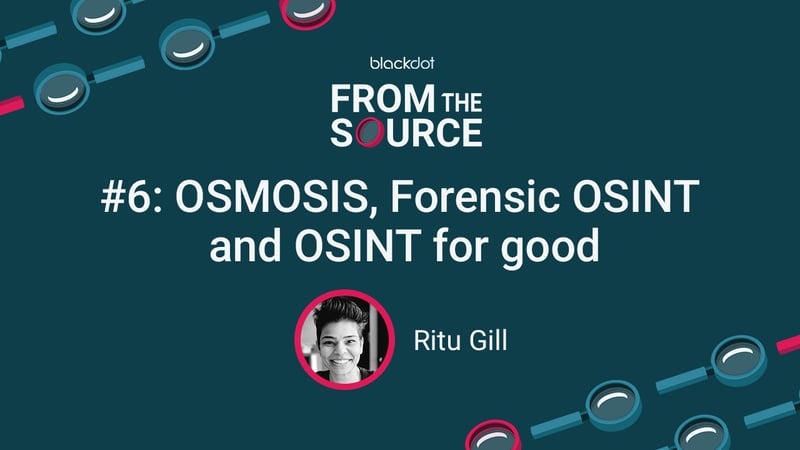In this episode of From the Source, Brett Redman, Head of Intelligence at Blackdot, discusses the evolving landscape, the importance of community, ethical considerations, and the role of technology in open source intelligence (OSINT). Read insights from Brett below or listen to the full episode here: The Power of Community in OSINT with Brett Redman.
From prison officer to Head of Intelligence at Blackdot
Brett’s journey into OSINT began with an interest in exploring the origins of American street gangs in the early 2000s. While he wanted to learn more continually, there wasn’t a centralised hub of this sort of information at the time. This passion for learning and accessing information online would help him later in life. He began working in the criminal justice system as a prison officer, where he discovered an intelligence gap around how street gangs were adopting UK custodial environments within establishments.
“My adoption of open source intelligence was more born out of curiosity and an appetite to continually learn more and gain as much information as I could online effectively,” he explains.
Today, Brett works as Head of Intelligence at Blackdot, the company behind investigation platform Videris.
Videris is a SaaS web-based investigations tool for investigators undertaking complex investigations using OSINT – in areas such as serious and organised crime, economic crime, due diligence and more. It provides users with data at what Brett calls ‘the speed of need’.
“When I think of some of the complex investigations that I've undertaken, particularly around financial intelligence, Videris is a significant player,” he explains.
The balance between people and technology
Brett explains that most people who have ended up in OSINT are inquisitive. He believes that this trait is embedded people who are good analysts.
“Even though AI is having a massive boom, I think good investigative tradecraft and methodology comes from human beings with the right tooling,” he explains, adding that humans drive the technology in this industry.
Brett says that organisations must recognise what technology can and can’t produce alongside the power of a curious human. To do this, they must understand precisely what they want to achieve and what it is capable of.
“I think there is a misunderstanding that this big red button will flash up and show us where all of the risks or all of these 'gotchas' are,” Brett adds.
The OSINT community
Brett says that the community is pivotal, especially considering how fast the industry is growing.
“I think that for all of the noise and all of the competition and the buzzwords that often are floating around the industry, there are incredibly sharp, ethical, grounded people doing real work every single day,” he says. “And often that gets missed.”
He adds that OSINT is still an emerging discipline without decades of formal doctrines. So, a willingness to learn from each other and shared values are vital to building credibility. Osmosis, the association for OSINT professionals, is an excellent example of this.
“It's a space where anybody from any walk of life, all the way from junior analysts or internet sleuths to law enforcement and policymakers, can come together and have real conversations,” he explains.
As the tech landscape continues to explode, Brett wonders how OSINTers can preserve the field's ethical core and build training that reflects the complexity of real investigations. He believes that organisations like Osmosis bring structure and frameworks to the table.
“If we don't get this right collectively as a community, no one's going to get it right as an individual,” he adds.
The OSINT pledge
For Brett, it’s not just about what OSINTers can find, but how they’ve procured it and ensuring they do so ethically. When conducting investigations, Brett always considers whether he could safely share his findings in a court of law. If the answer is no, he won’t take that step.
“We have to ensure that we're aware of the responsibility that we undertake, particularly when we operate in this industry, because we often deal with real people, real names, which often lead to real consequences,” says Brett.
He discusses the Berkeley Protocol, essentially the gold standard for using open source information ethically and legally. Ultimately, Brett says, this pushes investigators beyond social media screenshots, ensures OSINT work is meaningful and reminds them to protect the people they are investigating.
Listen to The Power of Community in OSINT with Brett Redman in full and stay tuned for even more OSINT insight on Blackdot’s next podcast episode.



